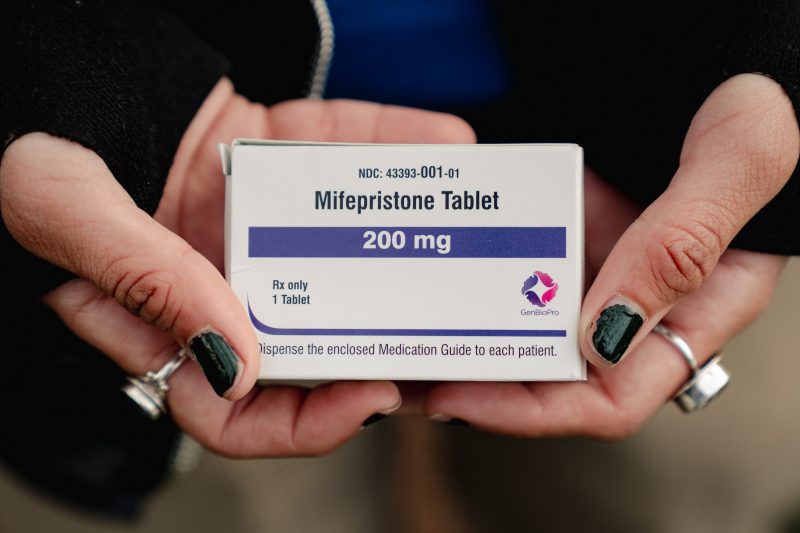
Democrats try ‘Trump-proofing’ their states ahead of Election Day
Washington and Massachusetts are stockpiling abortion pills. California is cutting climate deals directly with automakers. Colorado is rushing to protect the right to same-sex marriage. And attorneys general across the country are marshaling legal resources and privately plotting courtroom strategies.
From the West Coast to the East, blue states are preparing for the possibility that former president Donald Trump wins reelection in November by attempting to shield their policy priorities from the reach of a future Trump administration.
This preemptive strategy — “Trump-proofing” — encompasses a wide range of issues and programs that Democratic leaders fear could be targeted in another Trump presidency, based on his previous actions and his current campaign promises.
Even as they pursue such safeguards, Democrats are projecting confidence in their nominee, Vice President Kamala Harris, but they say it would be irresponsible to go into Election Day without a backup plan for their worst-case scenario.
The approach so far remains more concurrent than coordinated, with different states pursuing their own measures, but the country’s most liberal leaders forged close ties during Trump’s first term as they allied in opposition to him. Now they appear poised to unify again.
The effort provides a striking contrast to the 2016 election, when Trump’s victory took Democratic officials by surprise and sent them scrambling to respond. Much has changed in the eight years since, however, and experts say that even with the early Democratic organizing, the reach could be limited by the conservative transformation of the federal judiciary and the Supreme Court in Trump’s first term.
Still, leaders in blue state America believe the head start and hard-won experience will help them once again act as a bulwark against an agenda they deem dangerous.
“If Donald Trump should somehow be reelected, we’ll be ready from day one to respond,” said Robert Rivas, the speaker of the California Assembly and one of the top elected Democrats in a state that has styled itself as Trump’s fiercest sparring partner. “We’ve already stopped Trump once and we’re prepared to do so again.”
In the Biden administration and on the international stage, this work has been underway for months, as the president looks to lock in his legacy and alliances like NATO seek stability. But the preparations are especially pitched at the state level, where there’s a long tradition of conflict with the federal government, turbocharged by the moment’s hyper-partisanship.
“This has been the eternal battle,” said Thad Kousser, a political science professor at the University of California at San Diego. “And in our modern polarization, after every presidential contest, half the nation wants to move in the opposite direction of the president.”
States appear to be pursuing a three-pronged self-defense strategy, according to interviews with officials, advocates and experts, situated in governors’ mansions, state houses and courtrooms.
A spokesperson for the Harris campaign said a Trump presidency would “hurt every single American, no matter where they live,” and that the only way to stop him “is to elect Vice President Harris.”
A spokesperson for the Trump campaign accused Democrats of “fearmongering because they know the Trump-Vance ticket is winning on the issues that matter to voters,” and added that “Americans will ‘Kamala-proof’ our country” by reelecting Trump.
‘We know the playbook’
In shrink-wrapped cardboard boxes at an undisclosed government facility sits Washington state’s insurance policy against a future Trump administration. In them are 30,000 doses of mifepristone, the commonly used abortion pill that has become a flash point in the fight over reproductive rights.
Washington Gov. Jay Inslee (D) was one of several state leaders to order stockpiles of the medication last year, when a lawsuit threatened to limit access to the drug. The Supreme Court later rejected the challenge, but Inslee said last week that he would maintain the state’s stash — at least until the presidential race is decided.
Trump has suggested that he is open to using federal regulations to limit access to mifepristone, declining to rule out the move in a summer news conference. His campaign later said that “the Supreme Court unanimously decided on the issue and the matter is settled,” but the court’s ruling has no bearing on what his future administration could do and it left the drug vulnerable to additional legal challenges.
Massachusetts Gov. Maura Healey (D) is likewise preserving her state’s stockpile of 15,000 pills in case Trump returns to office.
“A Donald Trump presidency would be disastrous for states,” Healey said in a statement to The Washington Post, adding that “he would destroy reproductive freedom even more than he already has.”
The moves from Inslee and Healey are just the most recent examples of governors wielding their executive authority in attempts to counter what they expect to be Trump’s agenda. In California, Gov. Gavin Newsom (D), probably MAGA’s most visible state-level foil, has been working to secure a lofty climate agenda.
Trump has long gleefully targeted California, and his campaign has told reporters that as president he would again revoke the state’s power to set its own pollution limits on cars and trucks, among other things. (In a September news conference in the state, he also threatened to block federal fire aid to California unless Newsom bowed to his agenda on taxes and other topics.)
To counter any Trump action on the pollution front, Newsom announced an agreement earlier this year with the automaker Stellantis, one of the world’s largest car manufacturers. The pact ensures that Stellantis will comply with California regulations even if the state is “unable to enforce its standards as a result of judicial or federal action,” an arrangement similar to one Newsom brokered during Trump’s first term.
The deals underscore California’s ability, rare among states, to use its formidable economy and market muscle to shape policy regardless of what happens at the federal level.
Similarly, Newsom has increasingly acted as an international negotiator, pursuing agreements with China, Australia and others on climate change, a trend that is likely to accelerate if Trump retakes office and once again pulls the United States out of the Paris climate treaty, as he has pledged.
“We’re definitely trying to future-proof California in every way, shape or form,” Newsom said at a February news conference when asked about what a Trump presidency would mean for his state. “We know the playbook.”
‘Battle-tested’
After Trump’s 2016 election, California’s rattled legislative leaders vowed to “lead the resistance” to his administration.
That defiant pledge kicked off years of policymaking as the legislature’s Democratic supermajority pushed dozens of bills designed to insulate California, such as the 2017 “sanctuary state” law that limited communication between local authorities and federal immigration officials amid Trump’s threats of mass deportations.
“Here in California, we are already battle-tested,” Rivas said.
On Sunday, Newsom signed a bill that requires insurance companies to cover in vitro fertilization, citing GOP opposition to the treatment in explaining its urgency.
Trump has said his government would cover IVF, but he has offered few details to support the plan and advocates are skeptical, pointing to the way his views on reproductive issues have shifted over the years and to recent Republican votes against protecting the procedures.
State lawmakers have also sought to protect same-sex marriage, pushing onto the November ballot constitutional amendments securing it in California, Colorado and Hawaii.
While Trump has said he’s “fine” with the Supreme Court’s Obergefell ruling legalizing same-sex marriage, conservative Justice Clarence Thomas’s suggestion that it should be reexamined has alarmed the LGBTQ+ community. Advocates fear that Trump, if reelected, would appoint more far-right judges who could then facilitate further attacks on gay rights.
“We had to really address that issue now while we could,” said Colorado state Rep. Brianna Titone, co-chair of the Democratic caucus and sponsor of the state’s amendment to remove the constitutional ban on same-sex marriage. “A lot of basic protections people take for granted could be changed by a Trump administration.”
Titone said she plans to spend the next few weeks studying how a federal rollback of LGBTQ+ protections — like those the Trump campaign has already outlined — could harm Coloradans, and then prepare legislation that could fill the gaps.
Titone, however, acknowledged that there are legal and practical limits to what state lawmakers can do.
“If the administration took a hatchet to a lot of the federal rules that offer protections to Coloradans,” she said, “there could be some people who are really harmed because we just don’t have the bandwidth to respond to all the issues that could potentially come up.”
‘Everyone’s suing everyone’
Trump’s first term taught Democrats an important lesson: When lawmaking fails, try lawsuits.
State attorneys general are preparing to revive that strategy as early as Inauguration Day if Trump returns to office. Departments are war-gaming possible legal defenses and pledging to pick up where they left off in 2020.
“We’ll see what comes in November and beyond, but we won’t be caught flat-footed,” California Attorney General Rob Bonta said in a statement to The Post. “Fortunately and unfortunately, we have four years of Trump 1.0 under our belt.”
Bonta’s office declined to discuss specific legal strategy, but a spokesperson said staffers are reviewing what Trump has described as his second-term agenda as they prepare for what they expect to be a wave of lawsuits in the environmental, immigration and civil rights spaces.
They and other elected officials have also been studying plans put forth by Trump allies, particularly Project 2025, whose far-right policy prescriptions have drawn sustained campaign attacks from his opponents.
The voluminous compendium was crafted by many veterans of Trump’s first administration. He has of late disavowed the document, even as he earlier praised it and pushed similar policies on some fronts.
Lawsuits against the federal government have been ticking up since former president Barack Obama’s second term, said Paul Nolette, a political scientist at Marquette University and an attorneys general expert. But they skyrocketed during the Trump years, with Democratic states suing his administration more than 150 times, according to Nolette’s database of cases.
“It’s basically just exploded,” Nolette said. “Now it’s like everyone’s suing everyone over everything.”
Democrats were often successful, winning more than 80 percent of the cases against Trump, Nolette said, thus blocking some of the former president’s high-profile moves, like his push to include citizenship status on the Census and his attempt to cancel the program protecting undocumented immigrants brought to the United States as children, known as DACA.
But since many of those consequential cases were decided, the Supreme Court has shifted further to the right with Trump’s picks, mirroring a similar trend at the district level. And while Democrats have been planning ahead, Trump’s allies also have had years to fine-tune their own legal strategies.
“This isn’t a one-way ratchet,” Nolette said. “They’re both upping their game.”
